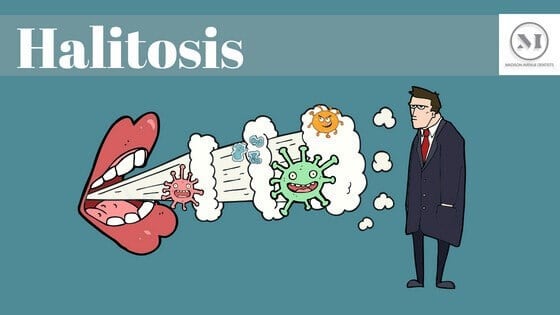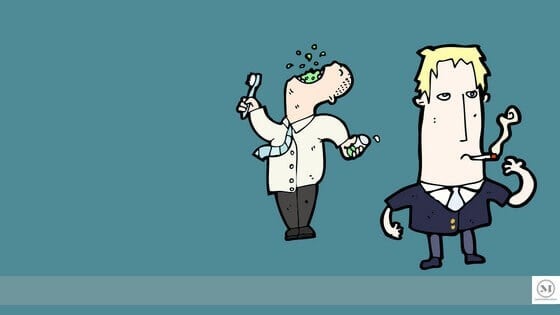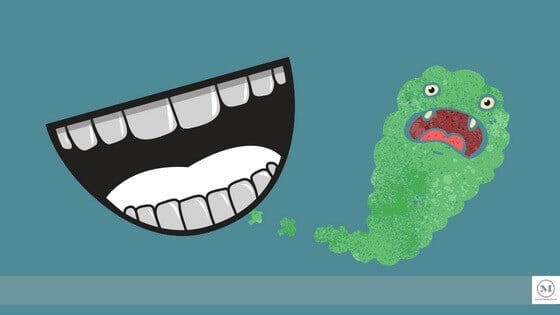Halitosis: How to Prevent Bad Breath?

Have you ever realized how bad breath causes timeless turnoff and how awful it gets? Bad breath or halitosis as what dental experts call it, is something that most of us suffer from at some point in our lives. Learn on how can you and your family deal with it.
WHAT IS HALITOSIS?
The unpleasant odors coming from the mouth is called Halitosis. 70% of the population deals with this problem- more than one out of 2 people! Unfortunately, because of our nose (olfactory nerves) which makes us used to our own breath, many are not aware of their breath smells like.
It seemingly becomes a social embarrassment if left untreated. Poor oral hygiene and dental related diseases result in Halitosis. Sometimes, it can be a result of some other medical illness.
WHAT ARE ITS CAUSES?

Factors of having the foul odor are the toxic byproduct coming from bacteria inside the mouth, digested food particles we’ve taken, infection and decay, and poor oral hygiene. A sulfur compound is produced by the decay and infection and this is responsible for the unpleasant odor in our mouth.
Halitosis is acquired from possible causes and 80% of which are: cavities, gum disease, cracked fillings and unclean dentures respectively.
Also, dietary factors count as well. Acidic foods, high-protein/low-carbohydrate diets, and onions and garlic will surely result in a breath like sour milk. Too much coffee and alcohol intake cause bad breath too. Lastly, those who use tobacco run a higher risk.
People with serious conditions such as diabetes, kidney failure or even liver malfunction are prone to bad breath. Xerostomia or dry mouth contributes to bad breath due to either treating the conditions mentioned or due to autoimmune conditions such as Sjogren’s Disease.
Stress, dieting, the interval in fasting, snoring, age and hormonal changes even affect your breath. The odor coming from the back of your tongue also implies postnasal drip or dirty tongue.
WHAT ARE THE OTHER COMMON CAUSES?

The following are the common causes of having bad breath or Halitosis:
Morning breath: When a person sleeps, saliva flow is decreasing, favoring the uncontrolled growth of noxious gas-producing bacteria.
Age: The quality of a person’s breath changes as we age. Unfortunately, the elderly suffer changes in the salivary glands resulting to poor quality and quantity of saliva even when oral hygiene is most favored. This could be due to medications that many elderly may be taking such as high blood pressure medications.
Dentures: Food debris coming from dentures and bridges matter. They produce an unpleasant odor when left overnight.
Infected Gums: the most common cause of bad breath is infected gums. Brushing carefully using soft-bristle toothbrushes and a regular habit of regular flossing get gums back into its healthy shape. A gum treatment and teeth cleaning every 3 months is really needed when you have infected or active gum disease. Madison Avenue Dentists can advise you on the best and appropriate treatment to obliterate the gum infection bad breath.
Dirty teeth: Anton van Leeuwenhoek, a 17th-century Dutch scientist known for his great work on the microscope once said, “There are more animals living in the scum on a man’s teeth than there are men in a whole kingdom.” Whether true or not, our teeth have the capacity to collect a fair share of odor-producing debris. Frequent brushing even with or without toothpaste can best keep oral bacteria. Even flossing or just swishing the mouth with water helps a lot.
A foul tongue: Never forget about your tongue once you’ve given your teeth and gums a thorough cleaning. When bacteria are removed from the back of your tongue, it can go a long way in fighting against bad breath. Using a toothbrush with soft bristle, brush gently and keep away from the very back of your tongue for it may case gagging reaction.
An empty stomach: Skipping meals or no meal intake at all can cause foul breath for it reduce saliva production needed to flush away bacteria from teeth, tongue, and gums. Stress can cause dry mouth which increases stomach acid. Chewing xylitol gum and xylitol lozenges can step up saliva flow, as can between-meal snacks such as fresh fruits and vegetables.
Smoking: Smoking gives you an awful cigarette breath. It was proven that tobacco causes dry mouth and damages cavity-fighting antibodies in your saliva. As you smoke, it causes a certain breath that can last several days even when smoking has been stopped. Historically, smoking is the number one cause of oral cancer and periodontal diseases.
Overuse of mouthwashes: It may sound unreasonable, but excessive use of mouthwash can worsen a bad breath problem as it irritates the oral tissue. As an alternative, you may try using rinse made of water and few drops of peppermint oil.
To eliminate bad breath, you need to stop it at the source.
HOW TO COPE WITH HALITOSIS? TIPS FOR COMBATING BAD BREATH
Having a bad breath is immensely embarrassing as it is a common condition. But, there are helpful ways to prevent it. Following these tips can help you fight bad breath as well as keep your mouth healthy on a daily basis.
1. Brush your teeth twice a day.
Make brushing your teeth two to three minutes at least twice a day a habit as it removes the plaque and food debris. Brushing your teeth before going to bed is indeed very important. Make brushing more helpful with baking soda to reduce the acidity in the mouth and block the bacteria that cause bad breath to grow.
2. Floss daily.
Flossing is one best way to remove food debris in between teeth as the toothbrush can’t reach. The bacteria will begin to feed on it when food debris is not removed and this will cause bad breath.
3. Brush or scrape your tongue.
An inexpensive tool called a tongue scraper is a good oral health investment. It removes any residue that may be build up between the taste buds and folds in the tongue. Tongue scrapers are readily available in drug stores. Hence, you can still use your toothbrush to brush your tongue.
4. Use a mouth rinse minimally.
There are possible cases wherein mouth rinses actually worsen a bad breath problem as it irritates the oral tissue present in the mouth. As an effective and inexpensive alternative, you can freshen-up your breath by rinsing water mixed with few drops of peppermint oil or rinse your mouth with black or green tea. According to a study made in the University of Illinois at Chicago, when you rinse with black or green tea, it suppresses the growth of bacteria leading to bad odor. Since black tea is notorious for staining, Dr. Stella Oh recommends drinking plain green tea or even rinsing with it. There have been studies that green tea removes bacteria and diminishes bacterial activity.
5. Visit your dentist.
The best way to make sure that you are maintaining good oral hygiene is to visit your dentist regularly. If you have chronic bad breath, you should visit your dentist first, to rule out any dental problems. Or, if your dentist believes that the problem is caused from a systemic (internal) source such as an infection, he or she may refer you to your family physician or a specialist to help remedy the cause of the problem.
6. Quit smoking and avoid tobacco products.
Simply quit smoking. Tobacco gives dryness to your mouth and can leave an unpleasant smell that lingers even after brushing your teeth.
7. Drink water often.
Drinking six to eight glasses of water daily is one of the best ways to avoid having a dry mouth. Drinking water will help keep odor under control because it helps wash away food particles and bacteria, the primary cause of bad breath. If you have a chronic dry mouth or take medications that cause you to have dry mouth, talk to your dentist about recommending an over-the-counter saliva substitute.
8. Eat a piece of sugarless candy or chew sugarless gum.
Try taking a piece of sugarless xylitol candy or gum as it helps stimulate a flow of saliva. The food debris and bacteria will be washed away by the saliva as it can cause bad breath.
9. Munch on a carrot, a stick of celery or an apple.
Healthy snacks such as fresh fruits and vegetable increases flow of saliva between meals to help remove bacteria from teeth, tongue, and gums causing bad breath. These snacks can also help alleviate bad breath caused by hunger or fasting. Avoid having an empty stomach from skipping meals for it may possibly cause foul breath as acids in the stomach build up.
CONSULT OUR DOCTORS, DR. OH AND DR. ESTAFAN
Our Doctors in Madison Avenue Dentists administer complete evaluation to diagnose and prevent bad breath and any underlying oral health. With our suggestions, bad breath problems will never be that difficult to handle. Contact our office today if you have any questions or make an appointment!